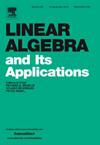论某些t理想的语言的规律性
IF 1.1
3区 数学
Q1 MATHEMATICS
引用次数: 0
摘要
我们考虑一个满足多项式恒等式的代数(pi -代数),并定义由它的t理想生成的语言是什么。我们猜想任意pi -代数的t -理想是正则的,并通过计算几类pi -代数的语言给出了支持这一猜想的结果。其中,我们计算了一些胶合细胞代数生成的语言,这是一个有用的工具,可以更好地理解所谓的zariski闭代数。本文章由计算机程序翻译,如有差异,请以英文原文为准。
On the regularity of the language of some T-ideals
We consider an algebra satisfying a polynomial identity (PI-algebra) and we define what the language generated by its T-ideal is. We conjecture the T-ideal of any PI-algebra is regular and in this paper we give results supporting the conjecture by computing the language of several classes of PI-algebras. Among them, we compute the language generated by some algebras of glued cells that are a useful tool to better understand the so-called Zariski-closed algebras.
求助全文
通过发布文献求助,成功后即可免费获取论文全文。
去求助
来源期刊
CiteScore
2.20
自引率
9.10%
发文量
333
审稿时长
13.8 months
期刊介绍:
Linear Algebra and its Applications publishes articles that contribute new information or new insights to matrix theory and finite dimensional linear algebra in their algebraic, arithmetic, combinatorial, geometric, or numerical aspects. It also publishes articles that give significant applications of matrix theory or linear algebra to other branches of mathematics and to other sciences. Articles that provide new information or perspectives on the historical development of matrix theory and linear algebra are also welcome. Expository articles which can serve as an introduction to a subject for workers in related areas and which bring one to the frontiers of research are encouraged. Reviews of books are published occasionally as are conference reports that provide an historical record of major meetings on matrix theory and linear algebra.

 求助内容:
求助内容: 应助结果提醒方式:
应助结果提醒方式:


